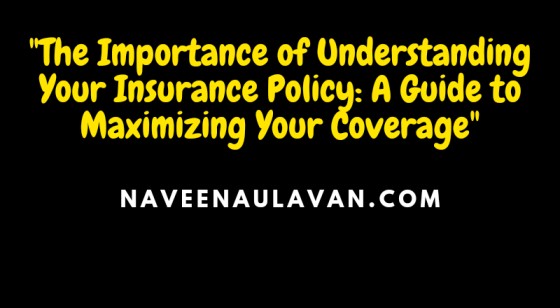Insurance policies are complex documents that are often difficult to understand. However, understanding your insurance policy is crucial to maximizing your coverage and protecting yourself and your assets. In this article, we will explore why it is important to understand your insurance policy and provide a guide to maximizing your coverage.
Why is understanding your insurance policy important?
There are several reasons why it is important to understand your insurance policy:
Protecting yourself and your assets
Insurance is designed to protect you and your assets from unforeseen events such as accidents, natural disasters, and theft. However, if you do not understand your insurance policy, you may not have the coverage you need when you need it most. For example, if you do not have enough coverage for a particular event, you may end up having to pay out-of-pocket for damages or losses.
Avoiding surprises and unexpected expenses
Many insurance policies have exclusions and limitations that may not be immediately apparent. If you do not understand these exclusions and limitations, you may be surprised when you file a claim and find out that you are not covered. This can lead to unexpected expenses that you may not be able to afford.
Maximizing your coverage
Understanding your insurance policy can help you maximize your coverage. By knowing what is covered and what is not, you can make informed decisions about the level of coverage you need and adjust your policy accordingly. For example, if you own a high-value item such as a piece of jewelry or artwork, you may need additional coverage to protect it.
How to understand your insurance policy
Here are some tips for understanding your insurance policy:
Read your policy carefully
The first step in understanding your insurance policy is to read it carefully. Make sure you understand the language and terminology used in the policy, and pay attention to any exclusions and limitations. If you do not understand something, do not hesitate to ask your insurance agent or company for clarification.
Ask questions
If you have any questions about your policy, do not be afraid to ask your insurance agent or company. They are there to help you understand your policy and can explain any confusing terms or concepts. It is important to ask questions before you need to file a claim, so you are prepared in case an unexpected event occurs.
Keep your policy up to date
Your insurance policy should reflect your current situation. If you make any changes to your assets, such as buying a new car or adding a swimming pool, make sure to update your policy accordingly. If you do not update your policy, you may not have enough coverage for your current situation.
Review your policy regularly
Review your policy regularly to make sure it still meets your needs. Your insurance needs may change over time, and it is important to make sure your policy keeps up with those changes. For example, if you get married, you may need to add your spouse to your policy.
Maximizing your coverage
Here are some tips for maximizing your insurance coverage:
Choose the right coverage
Choosing the right coverage is crucial to maximizing your insurance coverage. Make sure you have enough coverage to protect your assets and liabilities. For example, if you own a home, you should have enough coverage to rebuild it in case of a disaster. If you do not have enough coverage, you may have to pay out-of-pocket for damages.
Understand your deductibles
Your deductible is the amount you pay before your insurance coverage kicks in. Understanding your deductible can help you choose the right coverage and avoid unexpected expenses. For example, if you have a high deductible, you may be able to lower your premiums, but you will have to pay more out-of-pocket if you need to file a claim.
Bundle your policies
Many insurance companies offer discounts for bundling multiple policies, such as auto and homeowners insurance. Bundling your policies can help you save money and maximize your coverage.
Consider additional coverage
In addition to your standard insurance coverage, you may want to consider additional coverage to protect specific assets or liabilities. For example, if you own a business, you may need liability insurance to protect against lawsuits. If you own a valuable piece of jewelry or artwork, you may want to consider additional coverage to protect it.
Understand your policy limits
Your policy limits are the maximum amount your insurance company will pay for a claim. Understanding your policy limits can help you choose the right coverage and avoid unexpected expenses. For example, if you have a low policy limit, you may not have enough coverage to pay for damages or losses.
Know how to file a claim
Knowing how to file a claim can help you maximize your insurance coverage. Make sure you understand the claims process and what documentation you need to provide. If you have any questions about the claims process, ask your insurance agent or company.
Keep records of your assets
Keeping records of your assets can help you maximize your insurance coverage. Make sure you have documentation of your assets, including receipts, appraisals, and photographs. This documentation can help you prove the value of your assets and make it easier to file a claim if something happens.
Conclusion
Understanding your insurance policy is crucial to maximizing your coverage and protecting yourself and your assets. By reading your policy carefully, asking questions, keeping your policy up to date, and reviewing your policy regularly, you can ensure that your policy meets your needs. By choosing the right coverage, understanding your deductibles and policy limits, considering additional coverage, and knowing how to file a claim, you can maximize your insurance coverage and avoid unexpected expenses. Remember, insurance is there to protect you when you need it most, so it is important to make sure you have the coverage you need.
